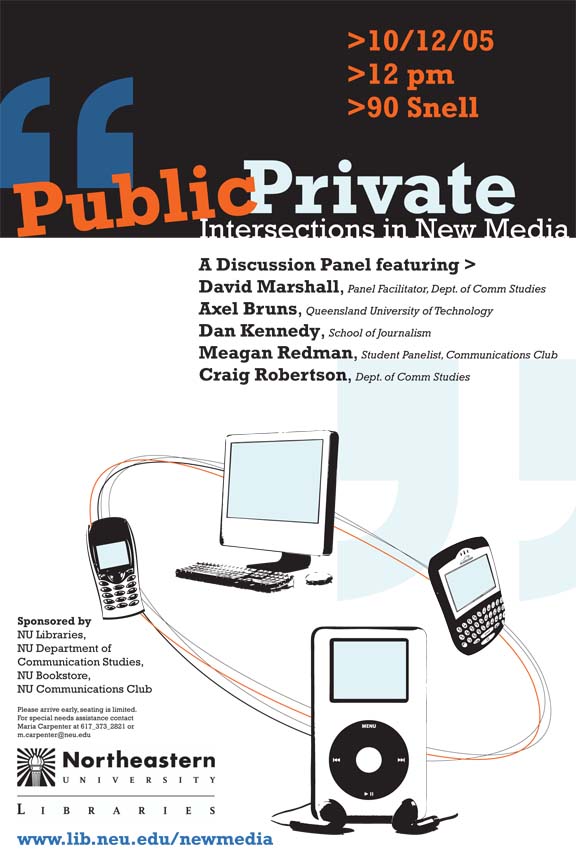You are here
Training to Talk(s)
 Right now I'm on an Amtrak train to Boston (currently stopping in a town called Mystic), where I'll take part in a panel on "Public/Private Intersections in New Media" with David Marshall and others. David has asked the panellists to prepare some brief points to address a set of questions we will be discussing - here are mine:
Right now I'm on an Amtrak train to Boston (currently stopping in a town called Mystic), where I'll take part in a panel on "Public/Private Intersections in New Media" with David Marshall and others. David has asked the panellists to prepare some brief points to address a set of questions we will be discussing - here are mine:
0. What do I think about new media?
We have to find a better term - for most of us, 'new' media are now everyday media, ubiquitous media, pervasive and invasive media; the 'virtual' has become very real. At the same time, we should remember that even the telephone remains a 'new' (and often unobtainable) medium for half the world's population. We should start defining these media no longer by how recent they are, but what their common characteristics are, and what uses they therefore enable for us; panels such as this are useful for this purpose. For me, the key aspects are that new media can be individual media (rather than mass media), heterarchical media (rather than hierarchical media), networked media (in a bottom-up distributed rather than top-down centralised sense), and participatory media (rather than what we could call spectator media).
1. Is there anything different about new media?
- New media enable
- interactivity
- intercreativity
- Intercreative uses
- break producer/consumer dichotomies
- turn users into producers of content
- this is a new hybrid practice: produsage
2. How has the public sphere changed in this era of new media?
- Produsage is participatory:
- more active involvement in the public sphere
- multiple perspectives represented
- Produsage of democracy?
- traditional mediated democracy has passive audiences
- produser-media democracy can me more deliberative
3. With the proliferation of the possibility of surveilling and monitoring that new media such as the Internet permit, should we be worried about the intrusion that these new forms (including mobile phones) have on our lives? How does it differ from past forms of social control that have been used by the modern nation-state?
- Yes:
- more potential for surveillance
- long-term effects of 'ephemeral' communication
- current climate of fear breeds homogeneity
- No:
- everyone is dirty
- potential for sousveillance
- backlash has started
4. We reveal a great about ourselves online, via blogs, via cellphones, internet chats, and other web-based connections. How have these technologies changed your everyday life? In what ways has this world of expansive narcissism, perpetual contactability, on-demand services and personalization of media forms via the ipod transformed your personal world positively and negatively?
- Negative:
- always on, always at work
- intrusive and interruptive
- traceable and open to abuse
- Positive:
- personal expression and networking
- new forms of (collaborative) creativity
- bottom-up produsage instead of top-down production/consumption
Well, there you have it. After the panel, I'm going on to Providence for my evening talk at Brown University. Perhaps this time I'll remember to record it...
- Snurb's blog
- Add new comment
- 23931 reads
 Printer-friendly version
Printer-friendly version

![Creative Commons Attribution-NonCommercial-ShareAlike 2.0 License [Creative Commons Attribution-NonCommercial-ShareAlike 2.0 License]](http://creativecommons.org/images/public/somerights20.gif)




